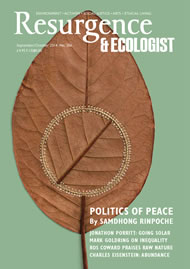Growing old gracefully – or even better, disgracefully – is a liberating experience. I recommend it. Especially when one is secure within the sturdy columns of Resurgence & Ecologist, where ageism poses no threat. Or not to me, because our Editor, with the consistency that is one of his hallmarks, is consistently and perennially one month older than I am.
The Editor puts himself about in the green cause a great deal more than I do… but does this, I wonder, show seemly respect to his assemblage of years? For my part I contend that there is nothing more actively green than senior inactivity. For instance, when I come in from putting myself about, not globally but locally, in the garden, and sit on the third step of the stairs to remove my boots… and don’t remove my boots because I’m overcome by an unquesting content that holds all motivation in suspense, I find myself in unregistered certainty that at this moment I am the world’s most engaged green activist. Look at my boots; look at the prohibited footprints I trace to the backdoor: mud, yes, but of carbon not one jot.
I should confess that when this impeccable absence of mind becomes conflated (I’ve never used that word before and am a little unsure as to its meaning) with senior activity in the garden, it, too, can be a threat to the environment. Last December for instance, I noticed that our glorious Viburnum tomentosum had layered a satellite of great promise. There was a vacant lot awaiting it far side of the garden. I dug round it with a spade, but the ground was stony and I couldn’t adequately loosen it. Stubborn, but I knew what to do: when men need to bring Nature into line they employ a machine. I fetched the car and the mighty rope I’d salvaged 30 years before from the beach. The adrenalin was flowing. I quickly looped one end of the rope round the bush, the other to the car’s tow-bar. I leapt aboard (yes, I still leap), started up, first gear and let out the clutch. Bang: no give! Brave bush, I thought. I reversed a yard and tried again. Ah, this time! I got out of the car to survey the surrender. My survey was prolonged, aghast, disbelieving. Absent-minded? No, this was criminal dotage. I stood there tearful, like King Lear facing the dead Cordelia, “a foolish, fond old man” – surveying the fallen glory of my most favourite, about to come into flower, Lonicera purpusii, winter-flowering honeysuckle. I had… you won’t believe this: I had roped the wrong shrub. All but torn it out by the roots.
But this is a story of Nature’s forgiveness. I ran my guilt and grief into the house, where I was disciplined by Antoinette (my wife) and despatched back into the garden with instructions. I restaked the honeysuckle, dressed it with the sweetest compost, and watered it with penitential tears and rescue remedy. Next day, without additional violence, I completed the transplant of the viburnum. It was one month later, testing a January day of boreal iciness, that I was frozen in my tracks. Not the burning bush, but full glimmer no less in the wintry light: the honeysuckle, winter’s starry welkin, in unprecedented flower.
And yesterday, a leap from that now to this, into mid-May’s gloaming, I’m the other end of the garden. Look, the endorsement of this new viburnum arrived in its sudden lacy flower. One now to another… I’m in sudden free fall back 50 years. Evening. New to the garden. Doctor, who had himself worked 30 years to bring the garden up out of a meadow, is so present I’m convinced I saw just now the old man bending over his rose. Maybe that day, or maybe the next, in memory of the Doctor I would start on the poem I called Reverie for Child and Garden. It began… It begins:
I inherited the garden towards dawn And keep it with a very moderate art But this may prosper now a child is born To simplify complexities of heart…
Which makes me smile, since recent evidence suggests that “moderate” may have been overstating it. I start back towards the house, trying to remember what “towards dawn” was meant to imply. A simple metaphor? So then, what of evening? Would that ever become metaphor for my time of day? So I say the poem aloud until… until let’s say I catch up with myself – at the end:







